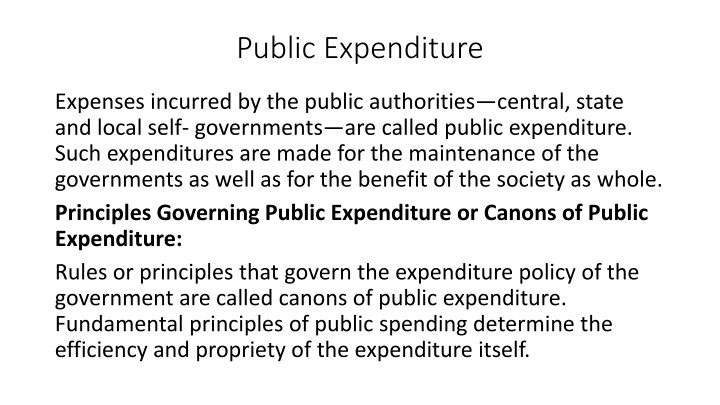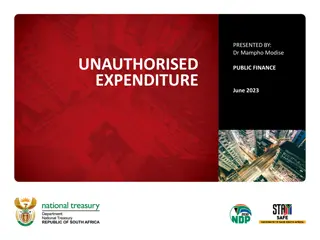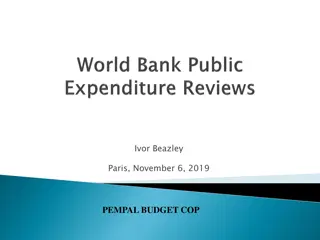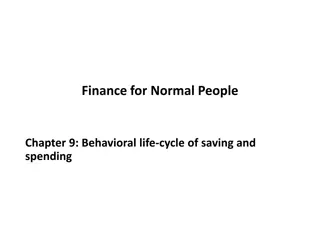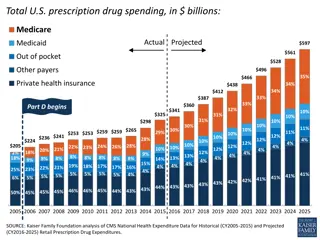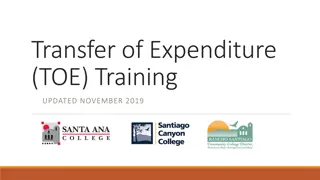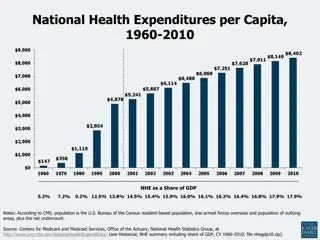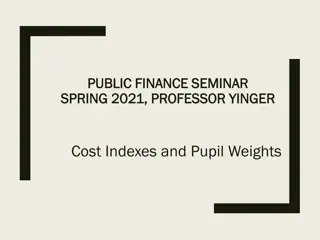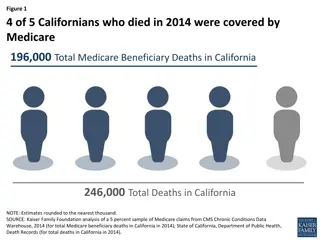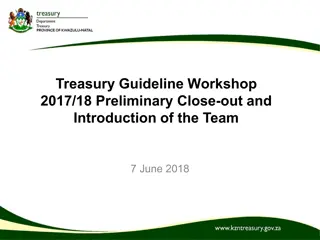Principles Governing Public Expenditure: Canons of Public Spending
Public expenditure refers to expenses incurred by government authorities for maintaining governance and societal well-being. The canons of public expenditure guide governmental spending by emphasizing social benefits, efficiency, proper sanctioning, and fiscal prudence to avoid deficits.
Download Presentation

Please find below an Image/Link to download the presentation.
The content on the website is provided AS IS for your information and personal use only. It may not be sold, licensed, or shared on other websites without obtaining consent from the author.If you encounter any issues during the download, it is possible that the publisher has removed the file from their server.
You are allowed to download the files provided on this website for personal or commercial use, subject to the condition that they are used lawfully. All files are the property of their respective owners.
The content on the website is provided AS IS for your information and personal use only. It may not be sold, licensed, or shared on other websites without obtaining consent from the author.
E N D
Presentation Transcript
Public Expenditure Expenses incurred by the public authorities central, state and local self- governments are called public expenditure. Such expenditures are made for the maintenance of the governments as well as for the benefit of the society as whole. Principles Governing Public Expenditure or Canons of Public Expenditure: Rules or principles that govern the expenditure policy of the government are called canons of public expenditure. Fundamental principles of public spending determine the efficiency and propriety of the expenditure itself.
While making its spending programme, government must follow these principles. These principles, in short, are called canons of public expenditure. (i) Canon of Benefit: According to this canon, public spending has to be made in such a way that it confers greatest social benefits. hus, public expenditure is to be made in those directions where general benefits rather than specific benefits flow in. Any public expenditure for the development of a backward area does promote social interest.
(ii) Canon of Economy: It refers to the avoidance of wasteful and extravagant expenditure. Public expenditure must be made in such a way that it becomes productive and efficient. Efficiency in public expenditure requires economy of expenditures. To enjoy the maximum aggregate benefit from any public spending programme, it is necessary that the canon of economy is observed. An uneconomic expansion in public expenditure will result in scarcity of funds, the much-needed growth of the productive sectors will be hampered. This means lower social benefit. It is
thus obvious that the canon of economy is not independent of the canon of benefit. (iii) Canon of Sanction: The canon of sanction, as suggested by Shirras, requires that public spending should not be made without any concurrence or sanction of an appropriate authority. Arbitrariness in public spending can be avoided only if spending is approved. Further, economy in public spending can never be ensured if it is not sanctioned.
(iv) Canon of Surplus: This canon suggests the avoidance of deficit in public spending. Like individuals, saving is a virtue for the government. So the government must prepare its budget in such a way that government revenue exceeds government expenditure so as to create a surplus. It must not run deficit to cover its expenditure. However, modern economists do not like to attach any importance to Shirras fourth canon the canon of surplus. To them, deficit financing is the most effective means of financing economic programmes of the government.
(v) Canon of Elasticity: The public expenditure should be fairly elastic. It should be possible for public authority to vary the expenditure according to need or circumstances. A fair degree of elasticity is essential if financial breakdown is to be avoided at a time of shrinking revenue. (vi) Canon of Neutrality: Canon of neutrality implies that public expenditure should have no adverse effect on production and distribution activities of the economy. Public expenditure should only
result in increased production, reduced inequality of income and wealth and increased economic activity. The spending activities of the government should always be directed to produce desirable effects and to avoid undesirable effect upon the economy. Public expenditure should only help to improve the production-distribution-exchange relationship in the economy. (vii) Canon of Productivity: This canon implies that, expenditure policy of the government should encourage production and productive efficiency of the economy. Public expenditure should be always directed
towards enhancing the productive capacity of the economy. Major part of public expenditure should be allocated for productive and development purposes. This will help to raise level of employment, income, effective demand etc. of the economy. The goal of public expenditure should be to maxi- mize higher incomes. (viii) Canon of Equitable Distribution: According to this canon, public expenditure should be incurred in such a way that the glaring inequalities in the distribution of income and Wealth are minimized. The
expenditure pattern of the government should be so designed to benefit the poorer sections of the community. Expenditure programmes should be ordained to provide more educational facilities, medical benefits, cheap housing facili- ties, old age pension and other social security measures to the vulnerable sections of the community. For achieving this canon, public expenditure should be planned according to specific programmes and prioritized as per the availability of funds.
Classification of Public Expenditure (1) Revenue Expenditure and Capital Expenditure: Revenue expenditures are current or consumption expenditures incurred on civil administration, defence forces, public health and , education, maintenance of government machinery etc. This type of expenditure is of recurrent type which is incurred year after year. Capital Expenditure of the government refers to that expenditure which results in creation of fixed assets. They are in the form of investment. They add to the net productive assets of the economy. Capital Expenditure is also known as
development expenditure as it increases the productive capacity of the economy. It is an investment expenditure and a non-recurring type of expenditure. For Eg. Expenditure on agricultural and industrial development, irrigation dams, public -enterprises etc, are all capital expenditures (2) Development And Non Developmental Expenditure / Productive And Non Productive Expenditure :- Expenditure on infrastructure development, public enterprises or development of agriculture increase productive capacity in the economy and bring income to the government. Thus they are classified as productive expenditure. All expenditures that
promote economic growth development are termed as development expenditure. Unproductive (non development) expenditure refers to those expenditures which do not yield any income. Expenditure such as interest payments, expenditure on law and order, public administration, do not create any productive asset which brings income to government such expenses are classified as unproductive expenditures.
(3)Transfer And Non Transfer Expenditure :- Transfer expenditure refers to those kind of expenditures against there is no corresponding transfer of real resources i.e., goods or services. Such expenditure includes public expenditure on :- National Old pension Scheme, Interest payments, subsidies, unemployment allowances, welfare benefits to weaker sections etc. By incurring such expenditure, the government does not get anything in return, but it adds to the welfare of the people, especially to weaker sections of society. Such expenditure results in redistribution of money incomes within the society.
The non transfer expenditure relates to that expenditure which results in creation of income or output The non transfer expenditure includes development as well as non development expenditure that results in creation of output directly or indirectly. Economic infrastructure (Power, Transport, Irrigation etc.), Social infrastructure (Education, Health and Family welfare), Internal law and order and defence, public administration etc. By incurring such expenditure, government creates a healthy environment for economic activities.
(4) Plan And Non Plan Expenditure The plan expenditure is incurred on development activities outlined in ongoing five year plan. For Eg In 2009-10, the plan expenditure of Central Government was 5.3% of GDP. Plan expenditure is incurred on Transport, rural development, communication, agriculture, energy, social services, etc. The non plan expenditure is incurred on those activities, which are not included in five-year plan. It includes development and non development expenditure. It includes :-Defence, subsidies, interest payments, maintenance etc.
(5) Other Classification Mrs. Hicks classified Public Expenditure on the basis of duties of government. It is as follows : a) Defence Expenditure :- It is expenditure on defence equipments, wages and salaries of armed forces, navy and air-force etc. It is incurred by government to provide security to citizens of country from external aggression.
b) Civil Expenditure :- Government/incurs this expenditure to maintain law and order and administration of justice. c) Development Expenditure :- It is expenditure on development of agriculture, industry, trade and commerce, transport and communication etc. Dalton s Classification (i) Expenditure on political executives (ii) Administrative Expenditure
(iii) Security Expenditure (iv) Administration of Justice (v) Social Expenditure (vi) Developmental Expenditure (vii) Public Debt
Economic effect of public expenditure 1. Effects on Production The effect of public expenditure on production can be examined with reference to its effects on ability & willingness to work, save & invest and on diversion of resources. (i) Ability to work, save and invest : Socially desirable public expenditure increases community's Expenditure on education, health, communication, increases people's productivity at work and therefore their incomes. With rise in income savings also increase and this in turn has a beneficial effect on investment and capital formation. productive capacity.
(ii) Willingness to work, save and invest : Public expenditure, sometimes, brings adverse effects on people's willingness to work and save. Government expenditure on social security facilities may bring such unfavourable effects. For e.g. Government spends a considerable portion of its income towards provision of social security benefits such as unemployment allowances old age pension, insurance benefits, sickness benefit, medical benefit, etc. Such benefits reduce the desire to work. In other words they act as disincentive to work.
(iii) Effect on allocation of resources among different industries & trade : Many a times the government expenditure proves to be an effective instrument to encourage investment on a particular industry. For e.g. If government decides to promote exports, it provides benefits like subsidies, tax benefits to attract investment towards such industry. Similarly government can also promote a particular region by providing various incentives for those who make investment in that region.
2. Effects on Distribution The primary aim of the government is to maximise social benefit through public expenditure. The objective of maximum social welfare can be achieved only when the inequality of income is removed or minimised. Government expenditure is very useful to fulfill this goal. Government collects excess income of the rich through income tax and sales tax on luxuries. The funds thus mobilised are directed towards welfare programmes to promote the standard of poor and weaker section. Thus public expenditure helps to achieve the objective of equal distribution of income.
Expenditure on social security & subsidies to poor are aimed at increasing their real income & purchasing power. Public expenditure on education, communication, health has a positive impact on productivity of the weaker section of society, thereby increasing their income earning capacity. 3. Effects on Consumption Public expenditure enables redistribution of income in favour of poor. It improves the capacity of the poor to consume. Thus public expenditure promotes consumption and thereby other economic activities. The government expenditure on welfare
programmes like free education, health care and housing certainly improves the standard of the poor people. It also promotes their capacity to consume and save. 4. Effects on Economic Stability Economic instability takes the form of depression, recession and inflation. Public expenditure is used as a mechanism to control instability. The modern economist Keynes advocated public expenditure as a better device to raise effective demand & to get out of depression. Public expenditure is also
useful in controlling inflation & deflation. Expansion of Public expenditure during deflation & reduction of public expenditure during inflation control money supply & bring price stability. 5. Effects on Economic Growth The goals of planning are effectively realised only through government expenditure. The government allocates funds for the growth of various sectors like agriculture, industry, transport, communications, education, energy, health, exports, imports, with a view to achieve impressive growth.
Government expenditure has been very helpful in maintaining balanced economic growth. Government takes keen interest to allocate more resources for development of backward regions. Such efforts reduces regional inequality and promotes balanced economic growth.
